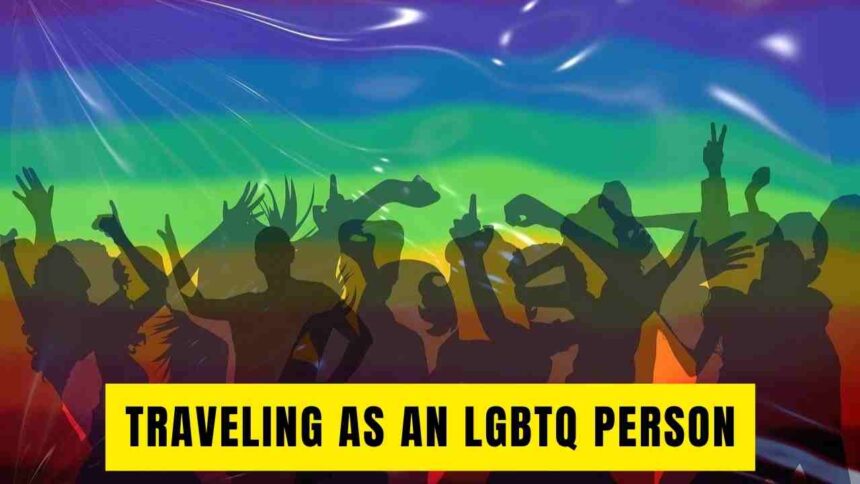Traveling as an LGBTQ Person: Last year, Emma-Jane Nutbrown promised to take the family on a vacation to Jamaica, but she came with a requirement: upon arrival, each member of the family had to donate to an LGBTQ organization. Given that Nutbrown and her brother Simon identify as gay, and that same-sex relationships between males in Jamaica are punishable by up to ten years in jail and hard labor, choosing to travel there was not without controversy. They went along to celebrate Simon’s 40th birthday in spite of their discomfort, all the while bringing attention to and funding for the local LGBTQ community.
How to apply for a visa online in India
“Simon felt uncomfortable traveling there, but we couldn’t really hold my parents accountable because most people travel for the destination, not the politics involved,” says Nutbrown, the founder of Queer Edge, a London-based organization that provides safe spaces for the LGBTQ community. Simon chose to utilize the trip as a platform for advocacy, asking for charitable donations in lieu of birthday presents, rather than declining to travel.
The tale of Emma-Jane and Simon is only one illustration of the extra factors LGBTQ tourists must take into account when making travel plans. The treatment of LGBTQ people in the area and their safety is of utmost importance. Nutbrown expresses a perspective that is widely shared: “I’m pragmatic, but I’m mostly against visiting to places where homosexuality is prohibited. Nothing is as simple as “Don’t go.”
According to the Human Dignity Trust, 64 nations still have laws against homosexuality in place, compared to 62 according to the International Lesbian, Gay, Bisexual, Transgender and Intersex Association (ILGA). Twelve of these nations—including well-known travel hotspots like Qatar and the United Arab Emirates—may apply the death sentence to same-sex relationships.
For many, the choice is clear-cut. London-based office manager Corey O’Neill decides not to go to nations where homosexuality is prohibited. When traveling, “anyone’s top priority is safety,” he says. Because of his position, O’Neill will be unable to go to places like the Egyptian pyramids, the Maldives’ overwater bungalows, and Kenya’s safaris, to name a few. He queries, “Why would I give money to a country that doesn’t want me to exist?”
This is not just an LGBTQ community sentiment. Allies have also vowed to boycott establishments and travel places that contain anti-LGBTQ laws. Brunei’s government owns the Dorchester Collection hotels, which have been the target of a boycott ever since the nation passed legislation permitting the stoning of LGBTQ people. Prominent individuals such as George Clooney have supported these boycotts, underscoring their significance. Still, not everyone thinks boycotts are the best course of action.
Engagement, in the opinion of Darren Burn, creator of the inclusive travel firms Out of Office and TravelGay, can be a potent instrument for change. There are homosexual people in every nation. We hear from people and employees at places who beg you to visit,” he says. Burn’s story emphasizes how engagement and visibility may promote acceptance and understanding for local LGBTQ populations.
Burn’s personal experience of being turned away from a hotel in Egypt with his partner because of their sexual orientation served as the impetus for his foray into the tourism sector. Out of Office was founded as a result, of establishing networks of hospitable vendors and tour guides. He makes the case that economic involvement may spur change, pointing out that several Caribbean countries with anti-LGBTQ legislation from the colonial era are progressively decriminalizing homosexuality. The president of African Travel Inc., Sherwin Banda, concurs.
As a child growing up in South Africa during the apartheid era, Banda saw firsthand how external pressure can propel societal transformation. He highlights how tourism can be a positive force in the world, promoting inclusion and leveraging traveler spending to help LGBTQ populations in the area.
In nations such as Morocco, where homosexuality is prohibited, the actual situation may not align with the legal framework. The first LGBTQ-created tour operator in the nation, Inclusive Morocco was formed by Bilal El Hammoumy and Rania Chentouf with the goal of promoting local community engagement while offering safe and hospitable travel experiences.
According to El Hammoumy, “tolerance is practiced but not preached in Morocco,” underscoring the complex reality for LGBTQ tourists. Discrimination still exists, even in states where same-sex partnerships are permitted. The creator of the LGBTQ travel community MisterB&B, Matthieu Jost, has experienced prejudice in Spain and France. His platform advises people to exercise caution and obey local laws while visiting nations where homosexuality is prohibited, since it may pose possible problems.
Choosing a location for LGBTQ visitors often involves striking a balance between ethical considerations, personal safety, and the desire to help local communities. “Travel does something no other industry can do,” as Burn puts it. The choice to go to or avoid a place is a very personal and nuanced one, reflecting the range of viewpoints found within the LGBTQ community. In the end, tourists such as O’Neill give precedence to locations that welcome and affirm LGBTQ+ individuals, since they get comfort and happiness from feeling really accepted. “The globe is full of stunning locations that embrace LGBT people. To me, that seems like a lot better vacation,” he says in closing.
Contributed by Sanal Pillai
Reference





